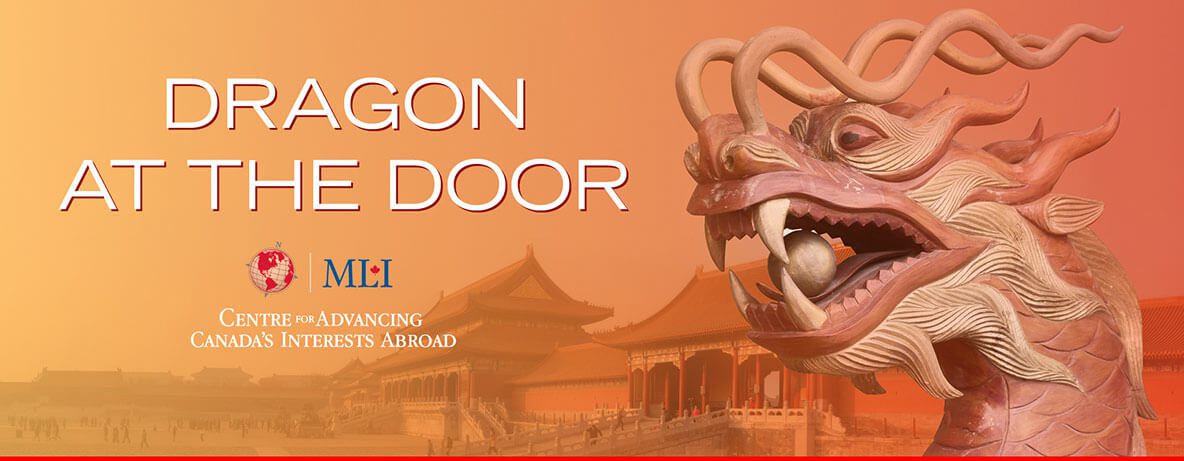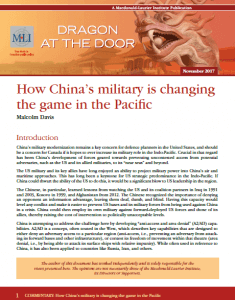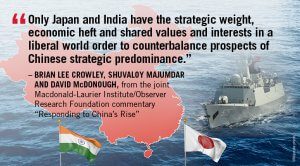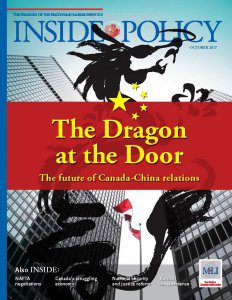
Should Canadians be wary of closer relations with China? That issue has been hotly debated as Canada's government considers entering negotiations toward a free trade agreement with the Asian giant. But what does China want, and what are the risks of dealing with its authoritarian regime?
To shed light on these issues, MLI is pleased to present The Dragon at the Door, a collection of critical essays by credible experts on the distressing realities of 21st century China. In doing so, we hope to offer readers an honest guide to the unflattering truths of a country whose reputation Canada's present leaders insist on shielding as they tighten bilateral ties.
Inside Policy October 2017
The October 2017 issue of Inside Policy introduced our Dragon at the Door series. Only a selection of articles appears in this issue of Inside Policy.
Introduced by Munk Senior Fellow Shuv Majumdar, this issue featured a range of articles by Commodore (Ret’d) Dr. Eric Lerhe, Harsh Pant, Duanjie Chen, and Charles Burton.
As Majumdar notes in his introductory essay, Canadians need to recognize that "China remains captive to a deeply regressive governing ideology." This series is meant to shed some light on the more troubling aspects of China’s rise under its leader Xi Jinping.
Other articles have since appeared, including by Peter Layton, Philip Cross, as well additional contributions from Duanjie Chen and Charles Burton. More will be available shortly.
How China’s Military Is Changing The Game In The Pacific
 As part of this series, we are pleased to feature a commentary exploring China’s military modernization and the challenge that it poses in the Western Pacific.
As part of this series, we are pleased to feature a commentary exploring China’s military modernization and the challenge that it poses in the Western Pacific.
The US military and its key allies have long enjoyed an ability to project military power into China’s air and maritime approaches. This has long been a keystone for US strategic predominance in the Indo-Pacific. By contesting this access, China could deal a significant blow to US leadership in the region.
To look at where China’s military modernization efforts may go, we are pleased to have the following commentary by Malcolm Davis, Senior Analyst in Defence Strategy and Capability at the Australian Strategic Policy Institute.
His cutting-edge analysis provides a window at what US defence planners, and those in Ottawa who might envision a greater Canadian role in the Indo-Pacific, may have to deal with in the near future. A shortened version of this commentary was also published in ASPI's The Strategist.
Previous Work
 This project is the latest in a number of articles and commentaries exploring different aspects of China's rise, and how the West needs to manage it. In August 2017, MLI jointly published a paper with the Observer Research Foundation, which was voted as the top think tank in India in a prestigious set of international rankings.
This project is the latest in a number of articles and commentaries exploring different aspects of China's rise, and how the West needs to manage it. In August 2017, MLI jointly published a paper with the Observer Research Foundation, which was voted as the top think tank in India in a prestigious set of international rankings.
In this paper, Brian Lee Crowley, Shuvaloy Majumdar and David McDonough point to the risk posed by a rising China and the case for a new Japan-India axis to counter China’s growing influence in the region.
“Only Japan and India have the strategic weight, economic heft, and shared values and interests in a liberal world order to counterbalance prospects of Chinese strategic predominance,” write Crowley, Majumdar and McDonough.
Other commentaries have explored the prospect of Canadian freedom of navigation operations in the South China Sea (Adam Macdonald), the possibility of a broader Canadian role in the Indo-Pacific (Kerry Nankivell), why Canada should stand with the US against China and North Korea (Edward Luttwak), and the threat posed by Chinese state-owned enterprises (Roger Robinson). Other Inside Policy articles have looked to Canada-Australia cooperation in light of China's rise (John Blaxland, Andrew Davies, Peter Layton).
Great Canadian Debate - Canadians Should Be Worried About Getting Too Cozy With China
 As Canada's government moves toward free trade with China, many Canadians are raising concerns that the ambitions of the Chinese regime are contrary to Canada's interests.
As Canada's government moves toward free trade with China, many Canadians are raising concerns that the ambitions of the Chinese regime are contrary to Canada's interests.
Others would argue that the economic opportunity presented by deeper ties with China must be seized now, and that country's evolution in recent years will make it an appropriate trading partner for Canada.
Who is right? Should Canadians be worried about getting too cozy with China? Robin Sears and Tony Keller debate this issue at MLI's Great Canadian Debates on Dec. 12.

No comments:
Post a Comment
Comments always welcome!